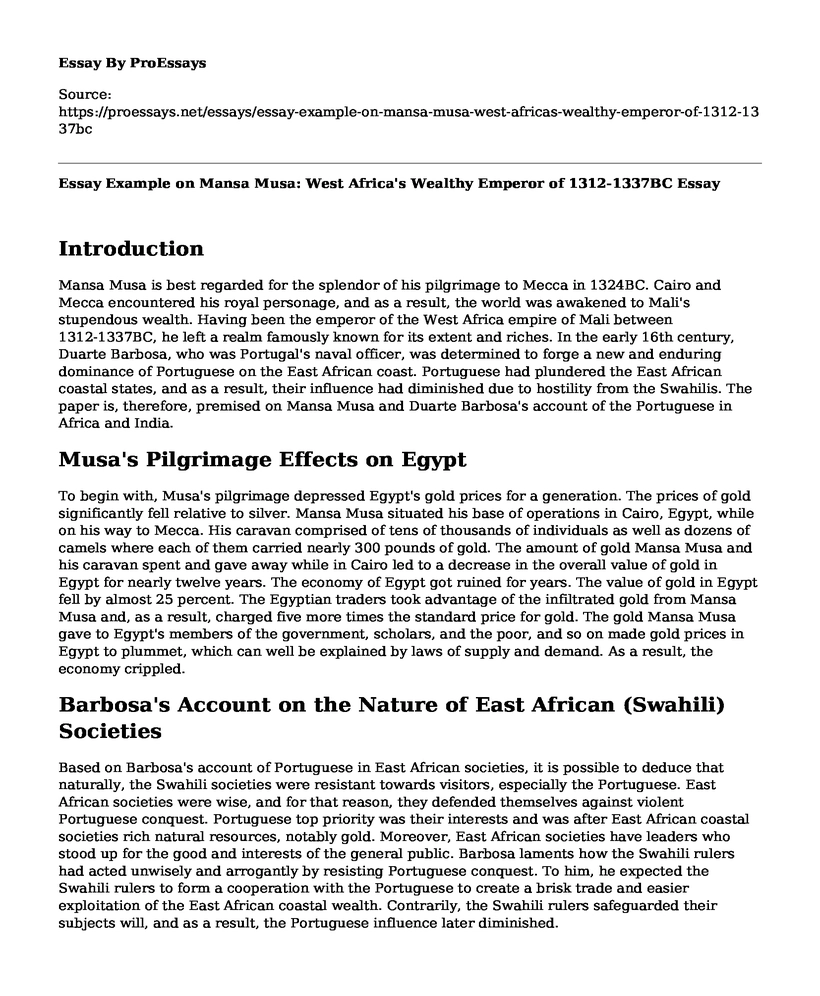Introduction
Mansa Musa is best regarded for the splendor of his pilgrimage to Mecca in 1324BC. Cairo and Mecca encountered his royal personage, and as a result, the world was awakened to Mali's stupendous wealth. Having been the emperor of the West Africa empire of Mali between 1312-1337BC, he left a realm famously known for its extent and riches. In the early 16th century, Duarte Barbosa, who was Portugal's naval officer, was determined to forge a new and enduring dominance of Portuguese on the East African coast. Portuguese had plundered the East African coastal states, and as a result, their influence had diminished due to hostility from the Swahilis. The paper is, therefore, premised on Mansa Musa and Duarte Barbosa's account of the Portuguese in Africa and India.
Musa's Pilgrimage Effects on Egypt
To begin with, Musa's pilgrimage depressed Egypt's gold prices for a generation. The prices of gold significantly fell relative to silver. Mansa Musa situated his base of operations in Cairo, Egypt, while on his way to Mecca. His caravan comprised of tens of thousands of individuals as well as dozens of camels where each of them carried nearly 300 pounds of gold. The amount of gold Mansa Musa and his caravan spent and gave away while in Cairo led to a decrease in the overall value of gold in Egypt for nearly twelve years. The economy of Egypt got ruined for years. The value of gold in Egypt fell by almost 25 percent. The Egyptian traders took advantage of the infiltrated gold from Mansa Musa and, as a result, charged five more times the standard price for gold. The gold Mansa Musa gave to Egypt's members of the government, scholars, and the poor, and so on made gold prices in Egypt to plummet, which can well be explained by laws of supply and demand. As a result, the economy crippled.
Barbosa's Account on the Nature of East African (Swahili) Societies
Based on Barbosa's account of Portuguese in East African societies, it is possible to deduce that naturally, the Swahili societies were resistant towards visitors, especially the Portuguese. East African societies were wise, and for that reason, they defended themselves against violent Portuguese conquest. Portuguese top priority was their interests and was after East African coastal societies rich natural resources, notably gold. Moreover, East African societies have leaders who stood up for the good and interests of the general public. Barbosa laments how the Swahili rulers had acted unwisely and arrogantly by resisting Portuguese conquest. To him, he expected the Swahili rulers to form a cooperation with the Portuguese to create a brisk trade and easier exploitation of the East African coastal wealth. Contrarily, the Swahili rulers safeguarded their subjects will, and as a result, the Portuguese influence later diminished.
Conclusion
In summary, the epic story of Mansa Musa pilgrimage to Mecca in 1324 constitutes the bulk of what is known regarding his reign. As a result of the journey to Mecca through Cairo, Egypt suffered unintended consequences brought about by Musa's incredible amount of gold. The economy crippled brought by depressed gold prices. Duarte Barbosa, in his book, gives an account of violent Portuguese conquest in East African societies. His plans to revive the diminished Portuguese dominance in the region is equally captured. As such, the nature of Swahili societies is also brought out in equal measure.
Cite this page
Essay Example on Mansa Musa: West Africa's Wealthy Emperor of 1312-1337BC. (2023, Sep 04). Retrieved from https://proessays.net/essays/essay-example-on-mansa-musa-west-africas-wealthy-emperor-of-1312-1337bc
If you are the original author of this essay and no longer wish to have it published on the ProEssays website, please click below to request its removal:
- Fidel Alejandro Castro Biographical Essay
- Should Americans Believe in a Unique American 'Mission'?
- Jack Herman's Involvement in the World War II Essay Example
- Essay Sample on Nixon's Vietnam War Policy: An Unsuccessful End to a Costly Conflict
- Essay Example: Uncovering the Lies of American History Textbooks
- Essay on Cultural Heritage of China: Crucial for Nation's Development & Survival
- Essay Sample on Alexander Hamilton: Orphan to Right-Hand Man







